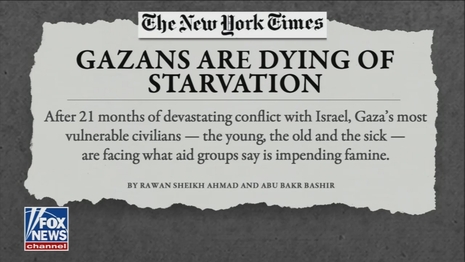 In an act many supporters of Israel were calling a “blood libel,” The New York Times first slapped an image of an emaciated Palestinian child on the front page of their Sunday edition paper and blamed Israel for his condition, accusing the Jewish state of using starvation as a weapon against children. But on Tuesday, the purported paper of record was forced to walk back their smears because it was exposed that the child had a pre-existing medical condition that was largely responsible for his physical appearance, and the image cropped out the child’s brother who appeared nourished.
In an act many supporters of Israel were calling a “blood libel,” The New York Times first slapped an image of an emaciated Palestinian child on the front page of their Sunday edition paper and blamed Israel for his condition, accusing the Jewish state of using starvation as a weapon against children. But on Tuesday, the purported paper of record was forced to walk back their smears because it was exposed that the child had a pre-existing medical condition that was largely responsible for his physical appearance, and the image cropped out the child’s brother who appeared nourished.
In an earlier edition of the report available via the Wayback Machine, The Times introduced the child, saying: “Mohammed Zakaria al-Mutawaq, about 18 months old, lives with his mother and brother in a tent on a Gaza beach.” Adding: “Mohammed, she said, was born a healthy child. ‘I look at him and I can’t help but cry,’ she said.”
On the child’s medical prognosis, The Times reported:
Mohammed was diagnosed with severe malnutrition by the Friends of the Patient clinic and Al-Rantisi children’s hospital, she said, but there was little they could do. On a recent visit to the clinic, she said, “they told me, ‘His treatment is food and water.’”
But following The Times’ emphasis on the child, it was discovered that he was born with a condition that effected his muscle development, likely contributing to the emaciated look of his body.
In the most up-to-date version of the story (as of the afternoon of July 30, 2025), the paper added this information to their copy:
Mohammed, according to his doctor, had pre-existing health problems affecting his brain and his muscle development. But his health deteriorated rapidly in recent months as it became increasingly difficult to find food and medical care, and the medical clinic that treated him said he suffers from severe malnutrition.
The Times was seemingly bamboozled.
“This article has been updated to include information about Mohammed Zakaria al-Mutawaq, a child in Gaza suffering from severe malnutrition. After publication of the article, The Times learned from his doctor that Mohammed also had pre-existing health problems,” their July 29 editor’s note read.
Of course, The Times wasn’t going to run a front-page disclaimer to counter their front-page misinformation, but they did issue this mealy mouth statement from “a spokesperson” on their PR account on X:
“Children in Gaza are malnourished and starving, as New York Times reporters and others have documented. We recently ran a story about Gaza’s most vulnerable civilians, including Mohammed Zakaria al-Mutawaq, who is about 18 months old and suffering from severe malnutrition. We have since learned new information, including from the hospital that treated him and his medical records, and have updated our story to add context about his pre-existing health problems. This additional detail gives readers a greater understanding of his situation. Our reporters and photographers continue to report from Gaza, bravely, sensitively, and at personal risk, so that readers can see firsthand the consequences of the war.”
The X account of Israel called out The Times and other anti-Israel outlets by pointing out that the child had “cerebral palsy,” and for not including images of his brother, who didn’t appear malnourished. The account accused those outlet of “playing in the hands of Hama’s propaganda war.”
“Without proper discloser. Without medical context. Without journalistic ethics,” the post concluded.
Billionaire CEO Bill Ackman suggested that “Israel should bring libel suits against the @nytimes and other publications. These are open and shut cases.”
“It’s a nice idea, but it would likely backfire,” warned Vel Freedman, the lead counsel for the successful Young v. CNN defamation suit. “If Israel sued, the NYT would claim the gist of the story is true because, they’d claim, kids are starving in Gaza. While we know that’s BS, the NYT would seek broad discovery into Israeli government documents and reports to ‘prove their ‘truth’ defense (something can’t be defamatory if it’s true).”
Fox News chief political analyst Brit Hume wrote on X: “Weak tea. The Times made a glaring mistake and can’t admit that without praising itself for bravery, sensitivity and personal risk.”
David Harsanyi, senior writer for the Washington Examiner, also commented saying: “Remember, they cropped out the healthy brother from the picture because they knew it was b.s.”
















